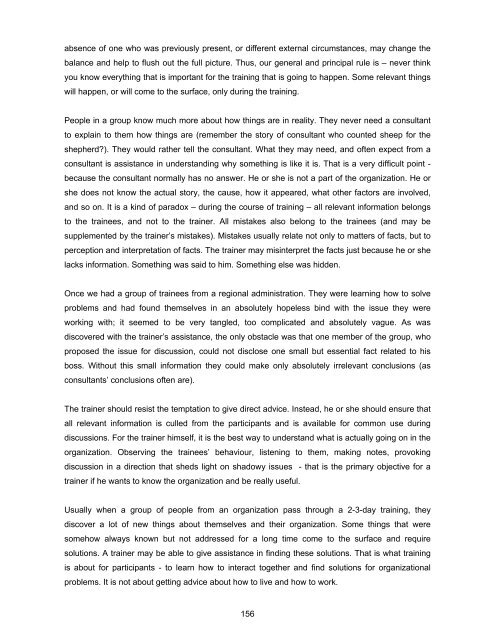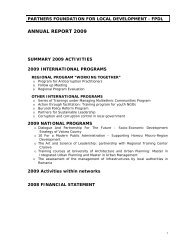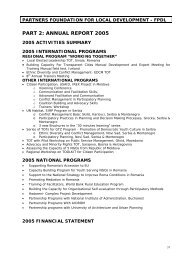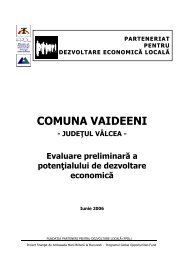Organizational Development: A Manual for Managers and ... - FPDL
Organizational Development: A Manual for Managers and ... - FPDL
Organizational Development: A Manual for Managers and ... - FPDL
Create successful ePaper yourself
Turn your PDF publications into a flip-book with our unique Google optimized e-Paper software.
absence of one who was previously present, or different external circumstances, may change the<br />
balance <strong>and</strong> help to flush out the full picture. Thus, our general <strong>and</strong> principal rule is – never think<br />
you know everything that is important <strong>for</strong> the training that is going to happen. Some relevant things<br />
will happen, or will come to the surface, only during the training.<br />
People in a group know much more about how things are in reality. They never need a consultant<br />
to explain to them how things are (remember the story of consultant who counted sheep <strong>for</strong> the<br />
shepherd?). They would rather tell the consultant. What they may need, <strong>and</strong> often expect from a<br />
consultant is assistance in underst<strong>and</strong>ing why something is like it is. That is a very difficult point -<br />
because the consultant normally has no answer. He or she is not a part of the organization. He or<br />
she does not know the actual story, the cause, how it appeared, what other factors are involved,<br />
<strong>and</strong> so on. It is a kind of paradox – during the course of training – all relevant in<strong>for</strong>mation belongs<br />
to the trainees, <strong>and</strong> not to the trainer. All mistakes also belong to the trainees (<strong>and</strong> may be<br />
supplemented by the trainer’s mistakes). Mistakes usually relate not only to matters of facts, but to<br />
perception <strong>and</strong> interpretation of facts. The trainer may misinterpret the facts just because he or she<br />
lacks in<strong>for</strong>mation. Something was said to him. Something else was hidden.<br />
Once we had a group of trainees from a regional administration. They were learning how to solve<br />
problems <strong>and</strong> had found themselves in an absolutely hopeless bind with the issue they were<br />
working with; it seemed to be very tangled, too complicated <strong>and</strong> absolutely vague. As was<br />
discovered with the trainer’s assistance, the only obstacle was that one member of the group, who<br />
proposed the issue <strong>for</strong> discussion, could not disclose one small but essential fact related to his<br />
boss. Without this small in<strong>for</strong>mation they could make only absolutely irrelevant conclusions (as<br />
consultants’ conclusions often are).<br />
The trainer should resist the temptation to give direct advice. Instead, he or she should ensure that<br />
all relevant in<strong>for</strong>mation is culled from the participants <strong>and</strong> is available <strong>for</strong> common use during<br />
discussions. For the trainer himself, it is the best way to underst<strong>and</strong> what is actually going on in the<br />
organization. Observing the trainees’ behaviour, listening to them, making notes, provoking<br />
discussion in a direction that sheds light on shadowy issues - that is the primary objective <strong>for</strong> a<br />
trainer if he wants to know the organization <strong>and</strong> be really useful.<br />
Usually when a group of people from an organization pass through a 2-3-day training, they<br />
discover a lot of new things about themselves <strong>and</strong> their organization. Some things that were<br />
somehow always known but not addressed <strong>for</strong> a long time come to the surface <strong>and</strong> require<br />
solutions. A trainer may be able to give assistance in finding these solutions. That is what training<br />
is about <strong>for</strong> participants - to learn how to interact together <strong>and</strong> find solutions <strong>for</strong> organizational<br />
problems. It is not about getting advice about how to live <strong>and</strong> how to work.<br />
156
















